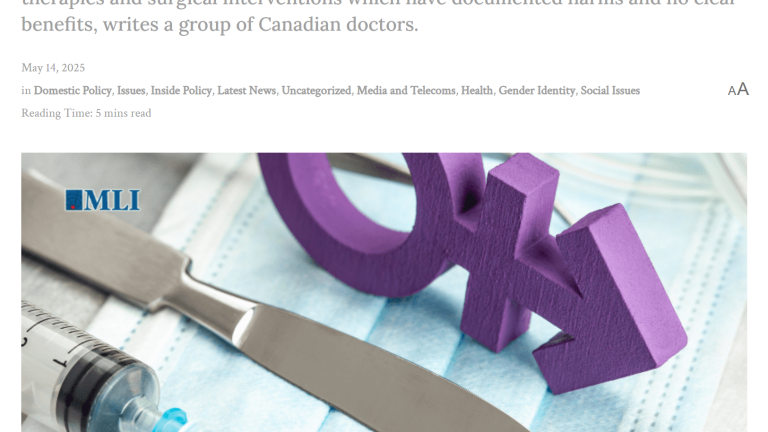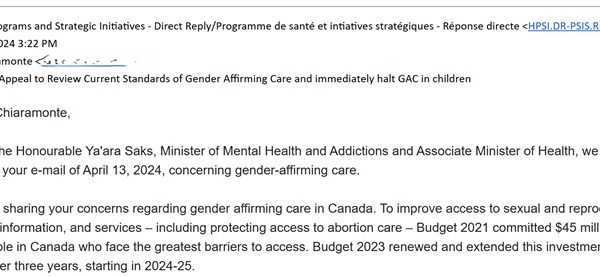The MacDonald Laurier Institute recently published a letter from 19 Canadian physicians challenging the public narrative around gender-affirming care for minors. The physicians argue that Canadian medical organizations—such as the Canadian Medical Association (CMA), the Canadian Pediatric Society (CPS), and provincial organizations like the Alberta Medical Association (AMA) —have misrepresented a broad consensus of support, leading the public to believe these treatments are universally accepted, safe, and effective.
According to the group, many physicians are actually skeptical of gender-affirming interventions for youth and believe stronger restrictions are needed. They claim that mainstream media and medical associations have been influenced by activist agendas, often silencing dissenting views and branding them as transphobic.
So-called “gender-affirming care” has proven risks and harms, but unproven benefits. It is not “life-saving,” but it is permanently life-altering.
A Divide in Canadian Medicine
While international momentum shifts toward caution, many Canadians remain unaware of the growing concerns due to consistent support from Canadian medical bodies such as the CPS, CMA and AMA. These organizations have publicly endorsed the current model of gender affirmation, reinforcing a public perception that the treatments are safe, effective, and widely accepted within the medical community.
This new group of Canadian physicians argue that many, if not most, practicing physicians believe there should be stricter safeguards and limitations on gender-related treatments for minors. They contend that dissenting voices are often silenced in a professional climate that stigmatizes criticism as transphobia.
The dissenting group argues that many doctors feel unrepresented and unheard within these increasingly ideologically-driven institutions.
They call out the example of Alberta, which introduced legislation last year placing age limits on gender-affirming treatments for minors, marking the first significant Canadian policy shift to align with emerging international caution. The legislation was developed with input from numerous medical professionals and was praised by many in the field—some publicly, many privately. Despite the support, legacy media outlets and medical associations swiftly condemned the move. Headlines warned of harm to vulnerable youth, and institutional statements criticized Alberta’s approach. Yet the physicians behind these critiques may not represent the broader medical community.
Canadian Gender Report published an open letter in response to the letters from these groups about the new Alberta legislation, pointing out that the CPS and AMA were misrepresenting the evidence upon which they were making claims for their arguments. Meanwhile, our mainstream media took their word at face value and condemned Alberta for putting children at risk.
The passage of Bill C-6 in 2022, which criminalized certain forms of opposition to gender transitions for minors, has added a layer of legal risk for healthcare professionals who express alternative views or decline to support gender-affirming interventions.
Concerns About Representation and Transparency
The group raised that concerns are growing in the medical community about how representative major medical associations truly are. The CMA, for instance, has seen a significant decline in engagement—from 87,000 members in 2018 to 75,000 in 2024—despite a growing number of physicians in Canada. Critics say these organizations are increasingly guided by activist agendas and maintain control with limited member input or accountability.
A Call for Open Debate and Evidence-Based Policy
We stand with the physicians behind this critique and know that countless parents and youth harmed by unquestioned gender affirmation do as well. We need an honest and open debate about gender-affirming care for minors in Canada. The science is far from settled. These interventions carry significant risks, and minors’ capability to consent to permanent, life-altering changes needs to be re-evaluated in light of the cultural pressures many youth are facing from peer groups, social media and the queering of Canadian schools and culture.
Media coverage and public policy should reflect the full spectrum of medical opinion—not just that of a vocal minority with institutional backing by special interest groups for whom open inquiry and debate appear to be a threat to their goals. This dynamic within once-trusted medical associations should raise red flags for all of us. Safeguarding children means applying the same standard of care, caution, and evidence-based practice that is expected in all areas of medicine. Canada needs to catch up with the rest of the world in this regard, and fast.




Finally!!! Thank you so much for this. As a psychotherapist, who is also a lesbian, I have felt very isolated in my own practice and welcome any and all attempts to stand up against the cult-like capture of so many organizations and individuals by the dangerous ideology of trans activism. Not only does this pose harm to young people in general, but also to the sex-based rights of girls and women in particular. It is also deeply homophobic and harmful to young gays and lesbians who are struggling to find their own rightful place in the world.
So much to talk about … so few opportunities. Any fellow travellers in Nova Scotia???